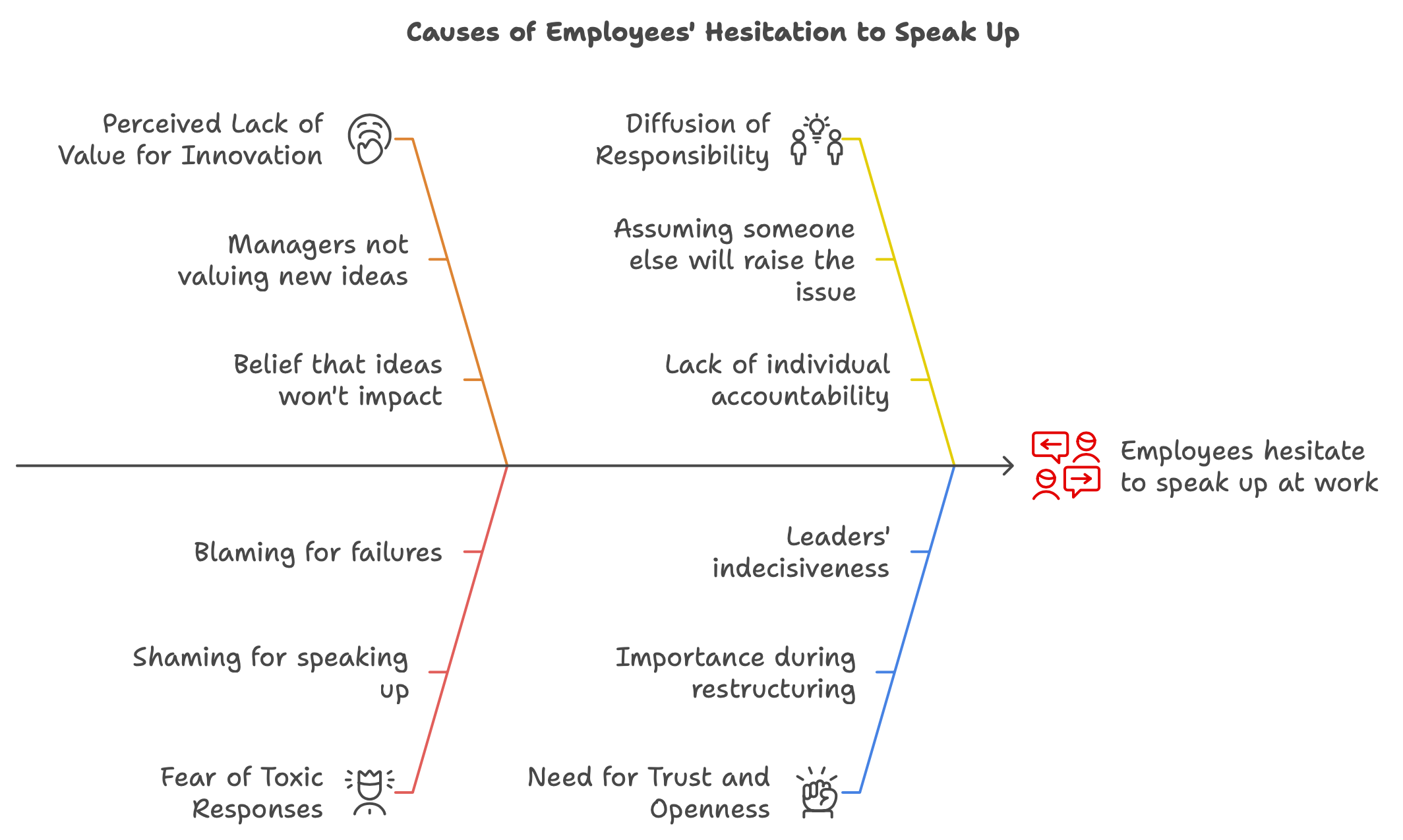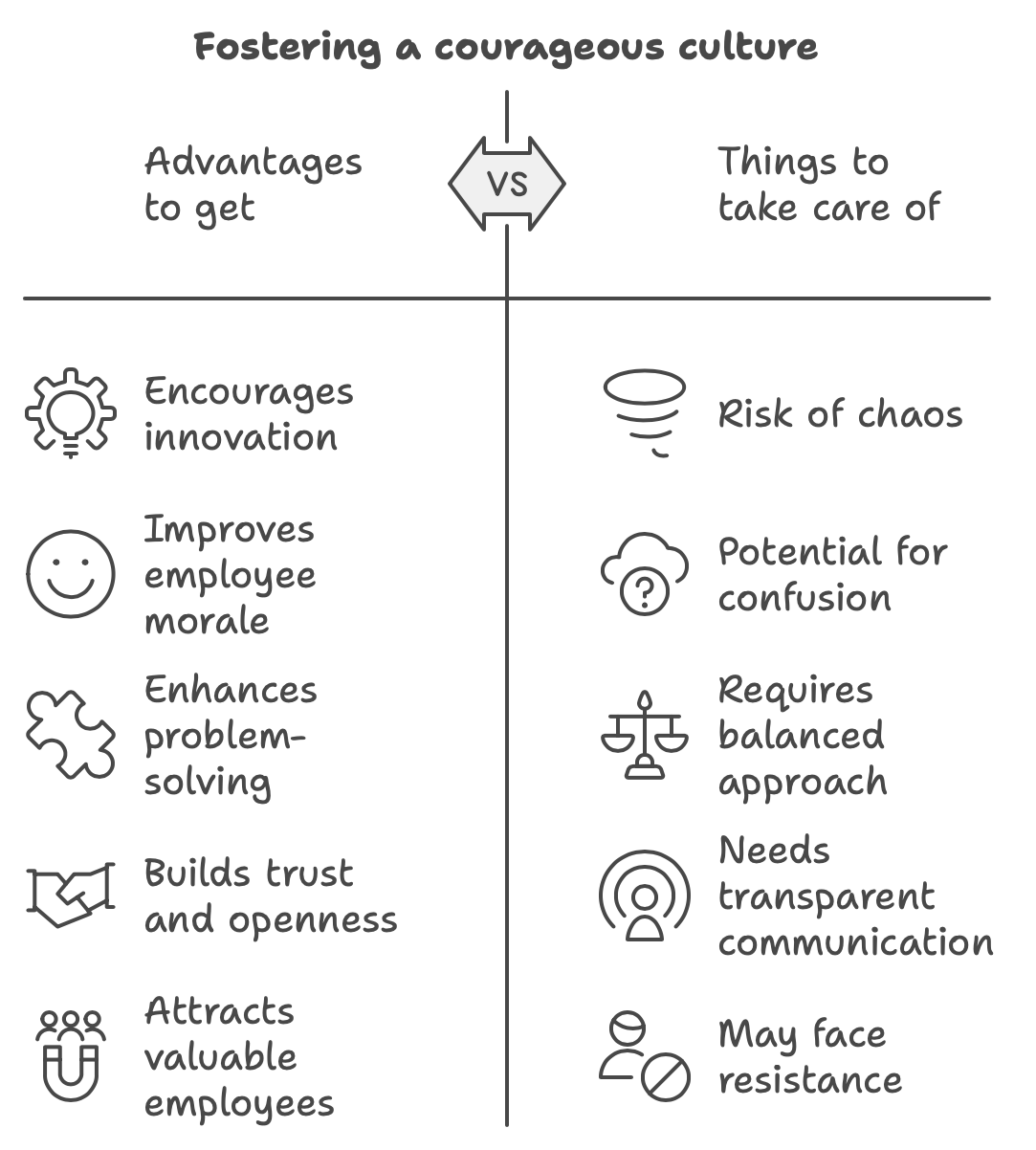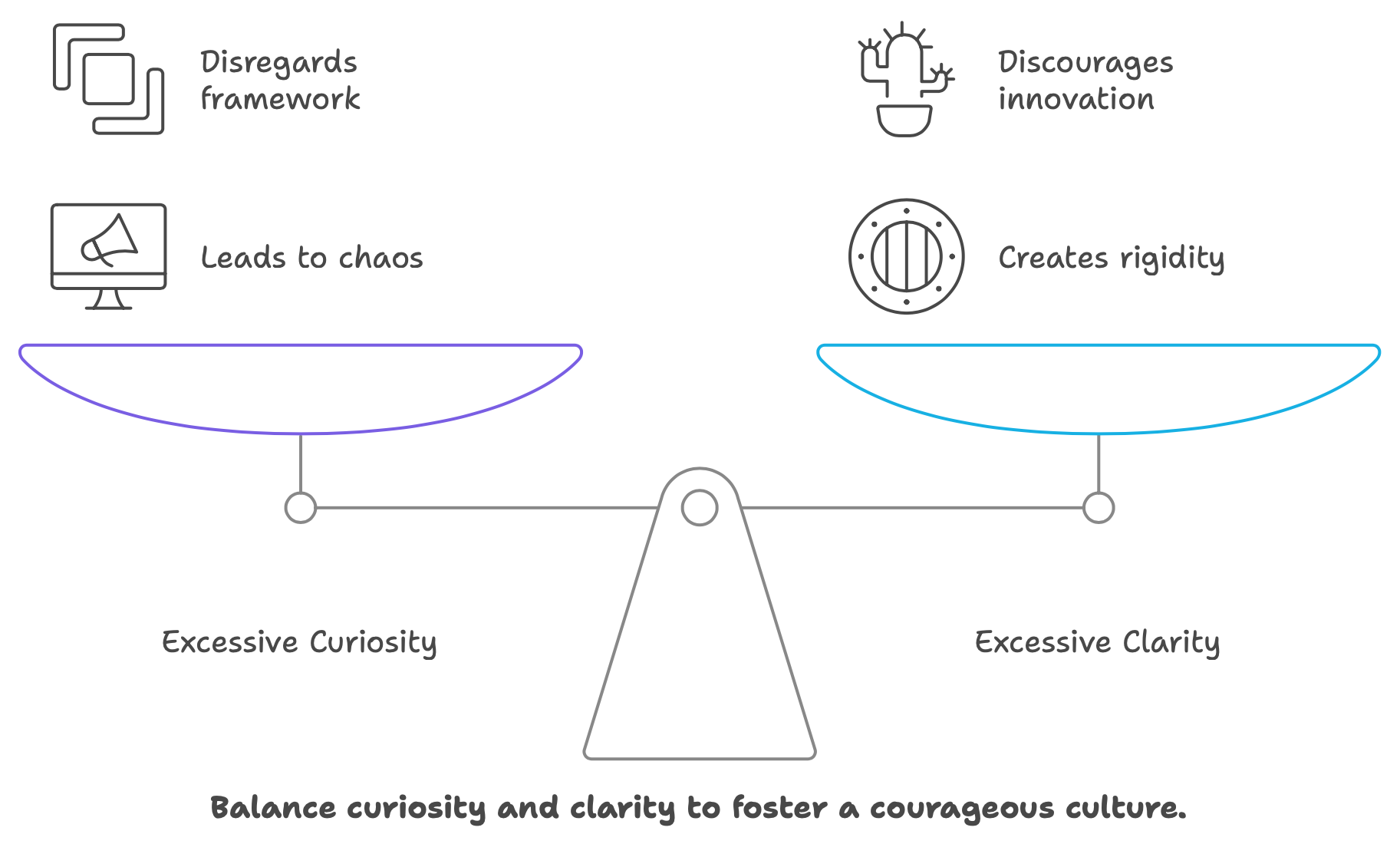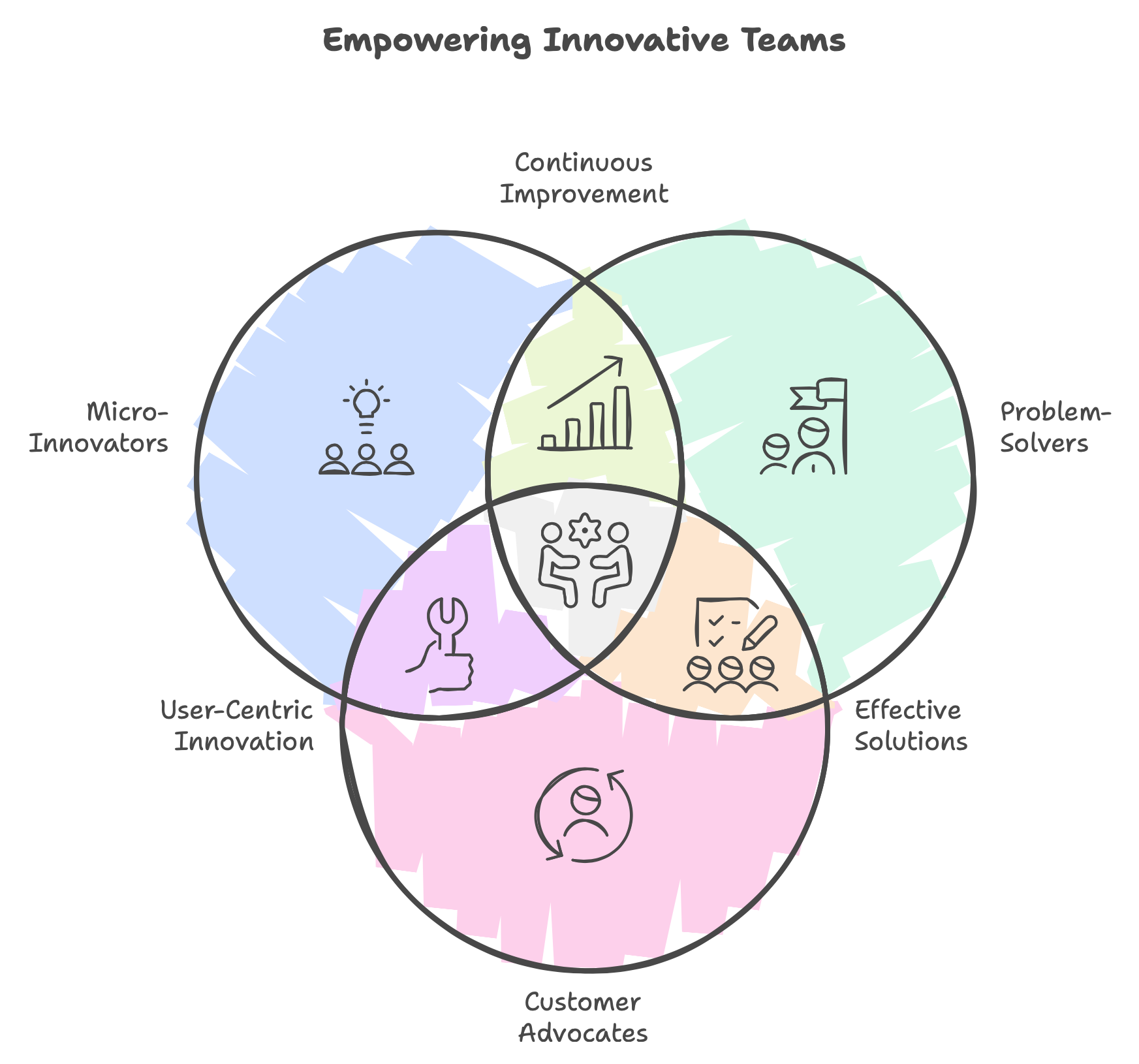You may have encountered employees who are hesitant to voice their concerns or opinions, even when they notice something wrong within their company. They prefer not to draw attention to themselves.
While this approach may initially seem safe, in the long run, it hinders personal growth and prevents companies from reaching their full potential. To foster an environment where employees feel comfortable speaking up, it is essential to create a culture of courage in the workplace. The following insights will guide you in establishing such an atmosphere. As your colleagues start to express their thoughts and ideas openly, both they and your business will reap the benefits.
In today's world, where automation is increasingly prevalent, establishing a courageous culture is crucial for growth. Imagine managing a team of enthusiastic, confident individuals who consistently approach you with fresh ideas. They eagerly share innovative services to reach new customers or propose cost-saving devices that could revolutionize product delivery. They might even suggest simple morale-boosting activities like hanging up a bulletin board for birthday greetings.
While this approach may initially seem safe, in the long run, it hinders personal growth and prevents companies from reaching their full potential. To foster an environment where employees feel comfortable speaking up, it is essential to create a culture of courage in the workplace. The following insights will guide you in establishing such an atmosphere. As your colleagues start to express their thoughts and ideas openly, both they and your business will reap the benefits.
In today's world, where automation is increasingly prevalent, establishing a courageous culture is crucial for growth. Imagine managing a team of enthusiastic, confident individuals who consistently approach you with fresh ideas. They eagerly share innovative services to reach new customers or propose cost-saving devices that could revolutionize product delivery. They might even suggest simple morale-boosting activities like hanging up a bulletin board for birthday greetings.

We are currently experiencing an automation revolution, where robots and computers are taking over routine tasks that were once performed by humans. However, machines cannot inspire people to speak up and share their best ideas for the company's thriving and expansion. Machines cannot empathize, coach, connect, or create. We still need human involvement for that.
Moreover, in today's gig economy, many employees no longer wish to confine themselves to traditional office hours if they can find more flexibility elsewhere. Studies reveal that one in three employees engages in contract work or freelancing, and nearly half of college students express a preference for entrepreneurship over traditional employment.
Creating a courageous culture is a magnet for valuable employees who can contribute to your company's success. You'll have micro-innovators who constantly seek small yet impactful ways to improve processes, streamline tasks, or enhance efficiency. Then there are the problem solvers who treat the workplace as their own company, actively seeking solutions. Lastly, your customer advocates tirelessly work to meet clients' needs.
By replacing a toxic culture with a courageous one, employees will gain the confidence to share their ideas openly.
Moreover, in today's gig economy, many employees no longer wish to confine themselves to traditional office hours if they can find more flexibility elsewhere. Studies reveal that one in three employees engages in contract work or freelancing, and nearly half of college students express a preference for entrepreneurship over traditional employment.
Creating a courageous culture is a magnet for valuable employees who can contribute to your company's success. You'll have micro-innovators who constantly seek small yet impactful ways to improve processes, streamline tasks, or enhance efficiency. Then there are the problem solvers who treat the workplace as their own company, actively seeking solutions. Lastly, your customer advocates tirelessly work to meet clients' needs.
By replacing a toxic culture with a courageous one, employees will gain the confidence to share their ideas openly.
Why Employees Hold Back: Uncovering the Fear of Speaking Up at Work
The question remains: Why do people hesitate to speak up at work?
The reasons can vary. Some individuals may refrain from offering new ideas because they believe their managers do not value innovation or that their ideas will have no impact. In other cases, people stay silent due to the diffusion of responsibility, assuming someone else will raise the issue.
However, many employees fear speaking up because they have faced toxic responses in the past. They worry about appearing foolish or being labeled a failure if their suggestions don't succeed.
The reasons can vary. Some individuals may refrain from offering new ideas because they believe their managers do not value innovation or that their ideas will have no impact. In other cases, people stay silent due to the diffusion of responsibility, assuming someone else will raise the issue.
However, many employees fear speaking up because they have faced toxic responses in the past. They worry about appearing foolish or being labeled a failure if their suggestions don't succeed.

Does your company suffer from "courage crushers"? These toxic behaviors include shaming employees for speaking up, blaming them for failures, or attempting to intimidate them when they raise uncomfortable truths. If so, it's crucial to make a change. Instead of allowing toxicity to permeate the workplace, you should cultivate a culture of courage.
Nurturing a courageous culture is particularly valuable during times of stress or transition. For instance, when a company undergoes restructuring and uncertainty looms, leaders may become indecisive, averse to innovation, and determined to cling to existing processes. In such circumstances, employees will only feel comfortable sharing their ideas if they operate within an environment of trust and openness.

Discovering the ideal balance between curiosity and clarity will result in your employees presenting you with groundbreaking ideas as a token of their appreciation. But what exactly do curiosity and clarity mean in the context of fostering courageous cultures?
Curiosity drives individuals to constantly seek ways to improve and innovate. On the other hand, clarity entails transparent communication about goals, processes, and roles within the organization. When there is a good level of clarity, employees feel secure and have confidence in the company's direction.
Balancing Curiosity and Clarity: Creating Space for Employee Innovation
However, it's important to strike a balance. Too much curiosity can lead to chaos and confusion, with everyone pursuing their own ideas and disregarding the company's framework. Similarly, excessive clarity can create a perception that the company culture is rigid, discouraging employees from speaking up.

Another effective method is to provide tools that encourage employee input, such as a "magic button" on their computers to submit ideas and feedback. Whether it's through online polls, suggestion forms, or even a physical bulletin board, these tools send a clear message that you are open to hearing from your employees.
By finding the right balance between curiosity and clarity, you create an environment that nurtures courageous cultures, where employees feel comfortable sharing their ideas and contributing to the company's growth and success.
Managers should foster a culture where every individual feels seen and heard.
Managing Diverse Teams: Fostering a Culture Where Every Voice Matters
Imagine your workplace and the diverse mix of coworkers surrounding you. Despite working in the same industry, everyone has unique personalities, making it challenging to create a cohesive culture. However, it's not impossible.
Just as employees are diverse, managers also vary in their approaches. Some may struggle to understand how to effectively treat their employees. For instance, if you value autonomy, you might grant your team freedom. But if your employees prefer a more nurturing approach, they may feel neglected. On the other hand, being an involved leader might stifle certain employees, hindering the emergence of their best ideas.
Just as employees are diverse, managers also vary in their approaches. Some may struggle to understand how to effectively treat their employees. For instance, if you value autonomy, you might grant your team freedom. But if your employees prefer a more nurturing approach, they may feel neglected. On the other hand, being an involved leader might stifle certain employees, hindering the emergence of their best ideas.

Silence from employees can stem from different factors. Some may have experienced past hurt when speaking up, while others take time to gather their thoughts before expressing themselves. Effective managers recognize when to provide guidance and when to let employees work independently.
There are also employees who flood your inbox with numerous ideas but lack a solid plan. As a manager, it's crucial to gently redirect these individuals who may unknowingly complicate matters.
When coaching employees, resist the urge to provide all the answers. Instead, empower them to find the courage to speak up meaningfully. Ask about their goals, their attempts, and the outcomes. Identify the tools they need to confidently contribute in the future, ultimately allowing them to experience the rewarding feeling of making a genuine difference.
Equipping employees with the necessary tools for workplace courage is the foundation for creating a culture where everyone can thrive and succeed.
I recommend you to read related articles:
From Startup to Unicorn: How Corporate Culture and Talent Acquisition Evolve Together
Internal Growth vs. External Expertise: Deciding How to Build Your Leadership Team
The Future of Leadership: Creating Communities Over Command
How Tailored HR Services Helping to Increase Organisational Efficiency
Tips for Candidate: How to Assess Company Culture during an Interview
UnitiQ: Building Courageous Teams for Innovation and Growth
UnitiQ’s flexible HR services empower businesses to assemble teams of micro-innovators, problem-solvers, and customer advocates. By creating a culture that encourages open communication and values employee input, UnitiQ helps organizations foster environments where individuals feel confident to share ideas.

Whether it’s designing feedback mechanisms, implementing performance management systems, or offering employee engagement programs, UnitiQ ensures that businesses cultivate teams capable of driving continuous improvement and innovation.
Through tailored HR strategies, UnitiQ enables businesses to thrive by turning employee insights into actionable growth opportunities.
Contact me, Olga Fedoseeva, Fonder at UnitiQ, directly:
My Telegram
My LinkedIn
Through tailored HR strategies, UnitiQ enables businesses to thrive by turning employee insights into actionable growth opportunities.
Contact me, Olga Fedoseeva, Fonder at UnitiQ, directly:
My Telegram
My LinkedIn








